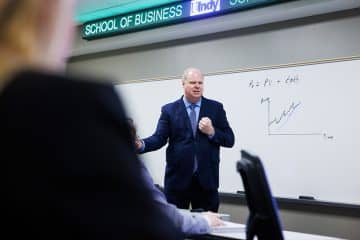Can I Earn an MBA Without a Business Degree? | Here Are the Facts
Our formative years don’t always prepare us for any changes in perspectives, interests, and goals that we accrue later on. For instance, it’s not uncommon for adults to change their career goals and pursue a field that has nothing to do with their previous studies as undergraduates. Without years and years of a foundation in their new field, however, it may not feel possible to catch up!
Nowadays, many students are jumping into the business school with the knowledge that MBA degrees have incredible outcomes. But many are also uncertain as to whether they can jump into an MBA program with a non-business degree.
You yourself may be wondering if you can earn an MBA without a business degree. The quick answer? A resounding YES.
There’s good news for undergraduate degree-holders wanting to pursue a Master of Business Administration. The great news is that an MBA is a professional degree, which means that there are no clear-cut requirements for entry. In fact, in some rare cases, an MBA program may not even require their applicants to have earned any undergraduate degree.
Go ahead and let out a sigh of relief—earning an MBA is possible! There are just a few important things you should know in order to get admitted.
Do You Meet the Prerequisite Criteria for an MBA Program?
Every school sets its own specific parameters to determine whether an applicant qualifies for admission. No matter what, there are sure to be some prerequisite expectations for anyone looking to enroll in such an upper-level program as an MBA. Depending on your school and prior area of focus, for example, you may have to take extra courses before you can enter the advanced business program.
Additionally, a common requirement for a Master of Business Administration is sufficient scoring on a GMAT test. The GMAT, or Graduate Management Admission Test, is a general reflection of your preparedness for a master’s-level business program. This is often the most essential pillar of an MBA application.
What to Expect: Non-Business vs. Business Undergrads
Although an MBA program is a business degree, that doesn’t necessarily mean that those who earned their bachelor’s in something other than business will be at a disadvantage. MBA curricula are chock-full of foundational courses are helpful for everyone to see the flexibility and usefulness of the degree across varying fields. Even if non-business undergrads have to take a few additional courses before entry, an MBA program usually begins with information that is new and essential for everyone.
Those with a bachelor’s in business are typically at more of an advantage only during the application process. Their business studies will help them feel more prepared for the GMAT, and they are likely to have already met most or all of the prerequisite criteria.
Is an MBA Worth It?
Especially if you didn’t live and breath the field of business in your undergraduate career, you might be prone to wonder whether you should even put in the work for such a new area of study. The fact is, however, that an MBA can be an extremely valuable tool for anyone in any corner of the workforce.
So many career opportunities are available for MBA-holding graduates, as they come with the relevant training needed to be an apt, strong leader—a necessity in every line of work. Whether you pursue business, a field related to your original undergraduate degree, or something entirely different, your MBA would be an excellent supplement to help you excel and thrive.
Let Abound Help You Find the MBA Program that Works for You
Abound provides a gateway to finding an MBA program tailored to your specific needs. Put our MBA database to use and make a positive change in your life with a Master’s Degree in Business Administration. Regardless of your educational background, we are confident that you can find the program that’s best for you.






